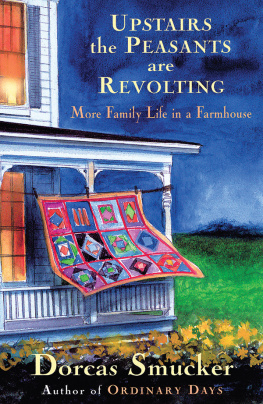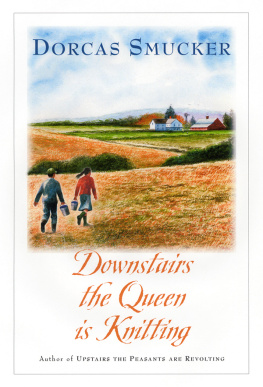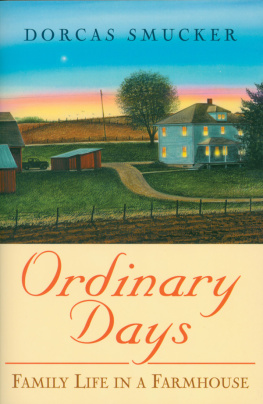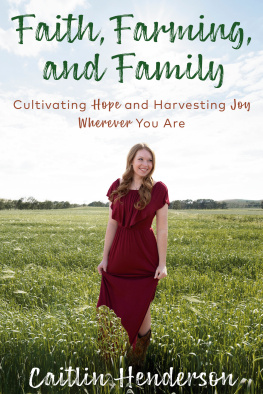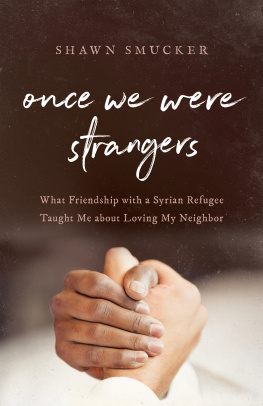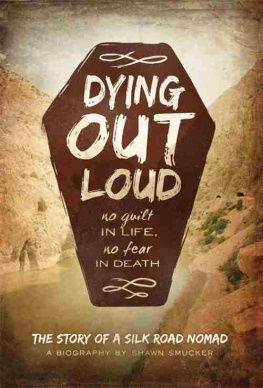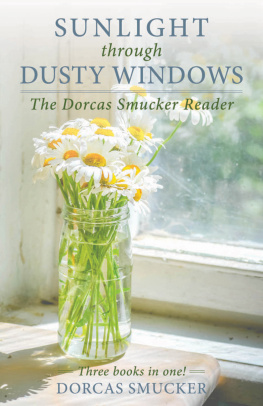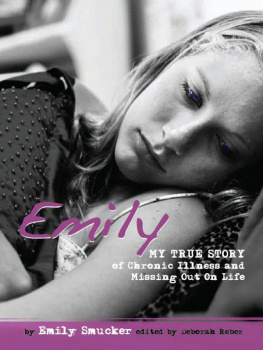A LSO BY D ORCAS S MUCKER ,
Ordinary Days: Family Life in a Farmhouse
Acknowledgments
Special thanks to my family: Paul, Matt, Amy, Emily, Ben, Steven, and Jenny. You still love me even when Im facing deadlines, you edit gently, and you seldom say, Oh Mom, dont you dare put that in an article!
Credits
All the essays in this book were published in The Register-Guard , Eugene, Oregon.
The scripture references on pages 44, 75, 90, and 104 are taken from the Holy Bible, New International Version NIV. Copyright 1973, 1978, 1984 by the International Bible Society. Used by permission of Zondervan. All rights reserved.
The scripture reference on page 84 is taken from the Revised Standard Version of the Bible. Copyright 1952 and copyright 1946, by Division of Christian Education of the National Council of Churches of Christ in the United States of America. Used by permission. All rights reserved.
The scripture reference on page 154 is taken from the Holy Bible, King James Version.
The photo on page 168 is by Ellen Gerig. The photo on the back cover is by Amy Smucker.
Cover illustration and design copyright 2007 by Wendell Minor.
Design by Cliff Snyder
UPSTAIRS THE PEASANTS ARE REVOLTING
Copyright 2007 by Good Books, Intercourse, PA 17534
International Standard Book Number: 978-1-56148-600-7
Library of Congress Catalog Card Number: 2007026805
All rights reserved. Printed in the United States of America.
No part of this book may be reproduced in any manner, except for brief quotations in critical articles or reviews, without permission.
Library of Congress Cataloging-in-Publication Data
Smucker, Dorcas.
Upstairs the peasants are revolting : more family life in a farmhouse / Dorcas Smucker.
p. cm.
ISBN-13: 978-1-56148-600-7 (alk. paper)
1. Country life--OregonWillamette River ValleyAnecdotes. 2. Farm lifeOregonWillamette River ValleyAnecdotes. 3. Smucker, DorcasFamilyAnecdotes.
4. Willamette River Valley (Or.)Social life and customsAnecdotes. 5. Willamette River Valley (Or.)BiographyAnecdotes. 6. MennonitesOregonWillamette River ValleyBiographyAnecdotes. 7. Spouses of clergyOregonWillamette River ValleyBiographyAnecdotes. I. Title.
F882.W6S56 2007
To my dad and mom,
Amos and Sara Yoder
You taught me how to butcher chickens, save money,
disc a field, have fun, bake bread, keep learning,
talk Dutch, write letters, can beans, tell stories,
feed lambs, fear God, and much more.
I love you both.
Table of Contents
Introduction
A s an Amish child, I grew up as much on stories as on cornmeal mush and mashed potatoes. Shelling bushels of peas on the front porch, we listened to old family stories from Mom, scary stories from my brothers, memories, imitations, and quotes.
Today, as a somewhat more modern Mennonite ministers wife, I still, like my mother, feed my children mashed potatoes and stories. I repeat the ones I heard from Mom and turn our family escapades into tales to be repeated while washing dishes or snapping buckets of green beans on the front porch.
A story is much more than just a story, of course. It is entertainment, identity, interpretation, and lessons. This is who we are, this is why we do what we do, this is important, that is not, and dont ever whack your brothers finger with a hatchet like your dad did to Uncle Philip.
Writing essays about my life was a natural progression from storytelling. I write what I know: Oregons Willamette Valley, growing grass-seed, our Mennonite church, my Amish past, our old farmhouse, my minister husband and six children. I have found what is true personally is also true universally. Even when the reader may be very different from me in location and lifestyle, we connect on the basicsfriendship, family, laughter, grief, solving problems, faith in God.
The chapters in this book do not appear in chronological order and are meant to be read one at a time. I hope they remind you of stories in your own life, to be recalled and pondered and eventually retold.
Priorities and People
Barbells for my brain
M y three-year-old daughter and I had a typical conversation the other morning. Jenny finished her breakfast and gave a satisfied belch. Cereal makes me burp! she announced, grinning. And pop, she added.
Pop? I said.
Pop makes me burp.
There was a short pause, then Jenny asked, Does wine?
Wine?!
Does wine make me burp?
I suppose it would.
Every kind of wine?
Yes. Where did you hear about wine?
In my Bible storybook. There was a wedding party and there was wine.
Another pause, then another question.
When Im four years old am I gonna drink wine?
No.
When Im five can I?
Jenny, I said, even Dad and I dont drink wine.
Why not? Huh? Why dont you?
Because um you can get drunk if you drink wine.
Whats drunk? she demanded.
I have been many thingsdizzy, sick, pregnant, deliriousbut never drunk.
I think its kind of like being dizzy, I finally said, feeling a bit dizzy with the pace of this conversation. To my relief, she dropped the subject, and I had a few minutes to recover before the next barrage of questions.
It was close to the same time that I started coming across suggestions for strengthening my mental abilities. 51 BRAINBOOSTING EXERCISES an Internet link shouted at me. In Readers Digest , I read, Shake things up. When your brain is stimulated, new connections are thought to form between brain cells. It went on to encourage me to turn a book upside down and read it for three minutes, or to take a class, which would give me more active brain cells.
The job of being a mom is sometimes perceived, among those who have never tried it, as a dull, unchallenging routine of washing dishes and wiping noses. But if being forced to think in new and different ways improves your brain, we moms may have the sharpest minds of anyone.
When adults ask me questions, their brains follow the same tracks as mine: Are you busy on Friday? What news have you heard from your sister?
Jenny, on the other hand, seldom thinks the way I do, and answering her questions is like driving a tractor across plowed furrows. She appears beside me when Im typing an e-mail message and desperately whispers, Mom! Whats inside your lips? When Im studying a new lasagna recipe, she wants to know if the floors in heaven are brown. How does rain make puddles? she asks at the breakfast tablefar too early, I think, for any conversation beyond Pass the butter.
While three-year-olds ask the most questions, older children challenge my brain in different ways. Amy, who is 14, surveys the world around her and makes pithy observations that I would never have thought of. This is the difference between Oregon and Minnesota, she told me, after a trip in December. In Oregon, you say, My aunt has a broom. And in Minnesota you say, My aahhnt has a brum. I couldnt have put it better myself.
Twelve-year-old Emily is an expert at what I call CBS (Clear Blue Sky) questions that force me to ask a dozen questions in return to figure out what shes talking about. How old was that Amish lady? for example. Or, What was that guys name?
Take a class, Readers Digest instructed me. If learning new facts gives me more active brain cells, my two boys must keep my neurons snapping like a bag of Orville Redenbachers in the microwave.

